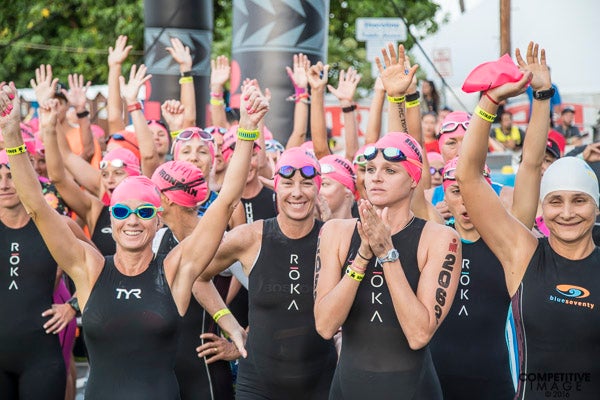How to Be a Great Mentor

Athletes get ready to compete in Kona. Photo: Paul Phillips/Competitive Image/<a href=http://twitter.com/compimagephoto>@Compimagephoto</a>
Hint: It’s not about having all the answers.
When I signed up for my first Ironman, I literally had no idea what I was doing. The extent of my experience with triathlon was 10 hours of watching my boss, Carlos, race Ironman Coeur d’Alene. On race morning, I firmly believed every person entering the water was a wetsuit-clad nutjob; by the time I went to bed, I had signed up to race an Ironman the following year. I didn’t own a bike, I had never swum in open water, and at the time, the longest I had ever run was a 10K—in short, I fit right in with the wetsuit-clad nutjobs.
I had one year to learn everything I needed to know about the triathlon. I bought every book, subscribed to every magazine, and read every blog. But what I came to discover is that the most important lessons weren’t in any book—they were dispensed on Sunday morning bike rides with Carlos, who took me under his wing and taught me everything I needed to know about Ironman. Not just how to swim, bike, and run, but how to endure— a word that became more complex and multifaceted every time I trained with Carlos. I did that Ironman, and then some—but more importantly, I gained a mentor who inspired me to do more and be better in all aspects of my life.
I was lucky—most new triathletes don’t have a mentor like Carlos. It’s one of the reasons why I wrote down all the lessons I learned from him, which became the book Life’s Too Short To Go So F*cking Slow. Everyone should have a Carlos in their corner.
But unlike most triathlon books, you won’t find a single training plan or nutrition guide in Life’s Too Short… There isn’t even much in the way of explicit advice, save for a race-day plan Carlos taped to my bike before my second Ironman: “Eat. Pace yourself. Don’t be a dumbass.” Because that’s not the way Carlos operated. Rarely did he give advice in such obvious fashion; like most good mentors, he led by example and let me believe I was smart enough to independently fashion the conclusions he led me to. (I was not smart enough. See above, re: nutjob.)
Years later, I’ve found myself in Carlos’s shoes, mentoring new triathletes. At some point in your time as an athlete, you’ll likely find yourself in the role of mentor, too. If you’re good at it, like Carlos was, you’ll do more than just teach about how to swim, bike, and run—you can truly change someone’s life.
How to Be a Good Mentor
Define your role.
Don’t say “If you need anything, just ask,” unless you’re willing for that offer be taken very literally. Are you willing to give up your solo training to show someone the ropes, or is the extent of your interest answering a question on Twitter every now and then? Be clear about what you are (and aren’t) willing to do as a mentor: “I’d love to have you join me at Masters Swim on Monday nights!” or “I’m not the person to go bike shopping with you, but here’s the name and number of my favorite shop.”
Listen.
Some mentors dispense generic advice and pat themselves on the back; good mentors know the flow of information goes both ways. Active listening is key to understanding what your protégé wants and needs, which is likely not the same as what you wanted or needed when you were in the same situation.
Don’t coddle.
One of the first rules Carlos set was that unless I was in immediate danger, he wouldn’t offer advice unless I asked for it. Even when he saw me making boneheaded mistakes (and I made many), he didn’t say anything, because good mentors know they’re not the best teacher—experience is. He could nag me when I ignored his reminders to eat during a 100-mile bike rides, or he could let the epic bonk hit me at mile 60. Guess which one was more effective?
Keep it real.
As backwards as it sounds, I respected Carlos the most when he said, “I don’t know,” followed by “let’s find out.” As a mentor, you might feel pressure to have all the answers, even when you don’t. But being honest about your shortcomings is one of the best things you can do—such openness is a valuable learning tool for both of you as you discover the answers together, building trust and strengthening your relationship.
Learn as much as you teach.
In the process of teaching somebody, you’ll likely learn a lot. When it comes to communicating information, which strategies work, and which ones flop? Could you have handled your emotions differently in that highly-charged situation? Is it possible a conflicting viewpoint from yours has merit? Be open to those lessons—you (and the athletes you mentor) will be better for it.
Remember: It ain’t about you.
Celebrate their achievements, not yours. Don’t take credit for your protégé’s success or make their accomplishments about you. There’s a difference between “Look at what a rockstar she is!” and “It was my honor to make her into a rockstar.” Good mentors know where to shine the spotlight.
[velopress cta=”Shop now” align=”center” title=”Buy the Book”]